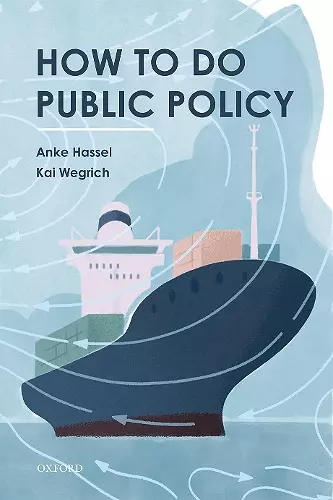How to Do Public Policy
Anke Hassel author Kai Wegrich author
Format:Paperback
Publisher:Oxford University Press
Published:15th Mar '22
Currently unavailable, and unfortunately no date known when it will be back
This paperback is available in another edition too:
- Hardback£92.00(9780198747000)

How to Do Public Policy offers a guide to students and practitioners on how to improve problem-solving with policies in a political world. It integrates insights from applied policy analysis and studies of the policy process to develop a framework that conceives policy-making as structured by two spheres of action - the 'engine room' of specialists and experts in government agencies, NGOs, research organizations etc., on the one hand, and the political 'superstructure' of politicians, key public stakeholders and the public, on the other hand. Understanding the different logics of the engine room and the superstructure is key for successful policy-making. The dual structure of policy-making provides a perspective on policy-analysis (interactive policy analysis) and policy-making (actor-centred policy-making) that moves from the focus on individual and specific measures, towards understanding and shaping the relation and interaction between policy interventions, the institutional context and the stakeholders involved or affected. Part I of the book presents the basic analytical concepts needed to understand the policy process and the structures and dynamics involved in it, as well as to understand how and why actors behave the way they do-and how to engage with different types of actors. Part II moves further into the nuts and bolts of policy-making, including policy design, implementation, and evaluation. Part III introduces and explores three key aspects of the capacity to make good policies: engagement with stakeholders, the process of policy coordination in a context of interdependence, and the role of institutions.
This is an excellent textbook to prepare students in public policy programmes for professional roles in the "engine room" of the policy process. It is well-structured and presents the approaches and analytical methods of public-policy studies lucidly. The authors uniquely and most impressively achieve to integrate technical policy analysis with the perspective of empirical political science. They discuss the tools and limits of evidence-based policy analysis brilliantly and combine them with a sophisticated, but non-cynical, awareness of how policy choices are shaped by multi-actor politics, responding to the contingent salience of political scandals, crises, and windows of opportunity. The book effectively conveys the teachable skills for policy analysts with a realistic awareness of the importance and the limits of their role in the irreducible contingencies of political processes. * Fritz W. Scharpf, Emeritus Director, Max Planck Institute for the Study of Societies *
ISBN: 9780198747192
Dimensions: 234mm x 156mm x 20mm
Weight: 680g
400 pages